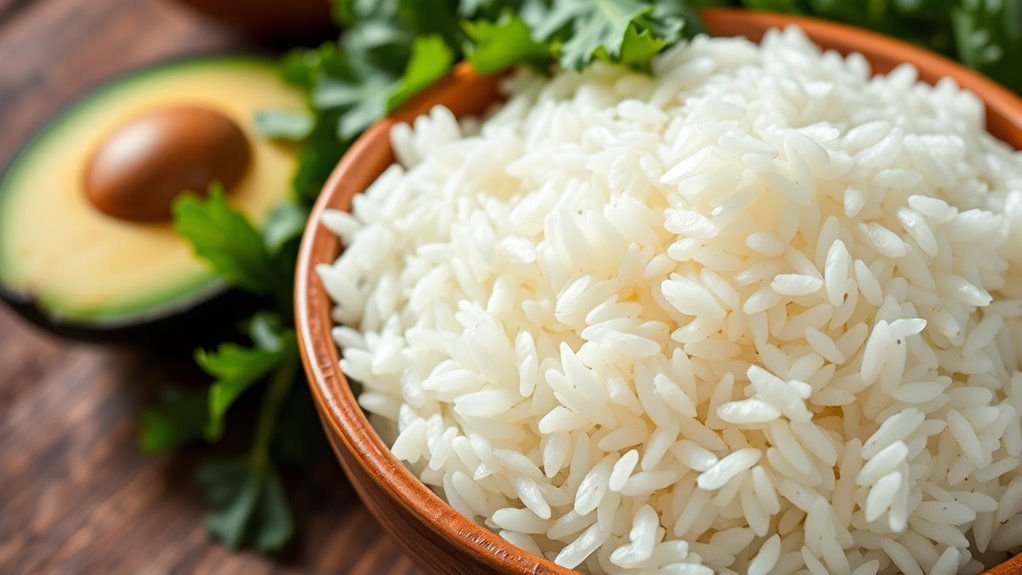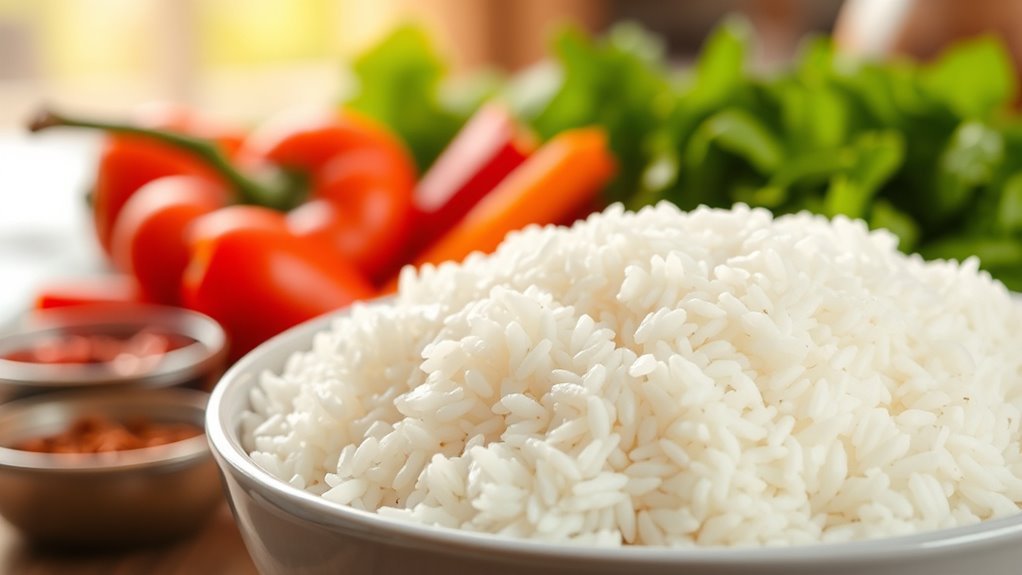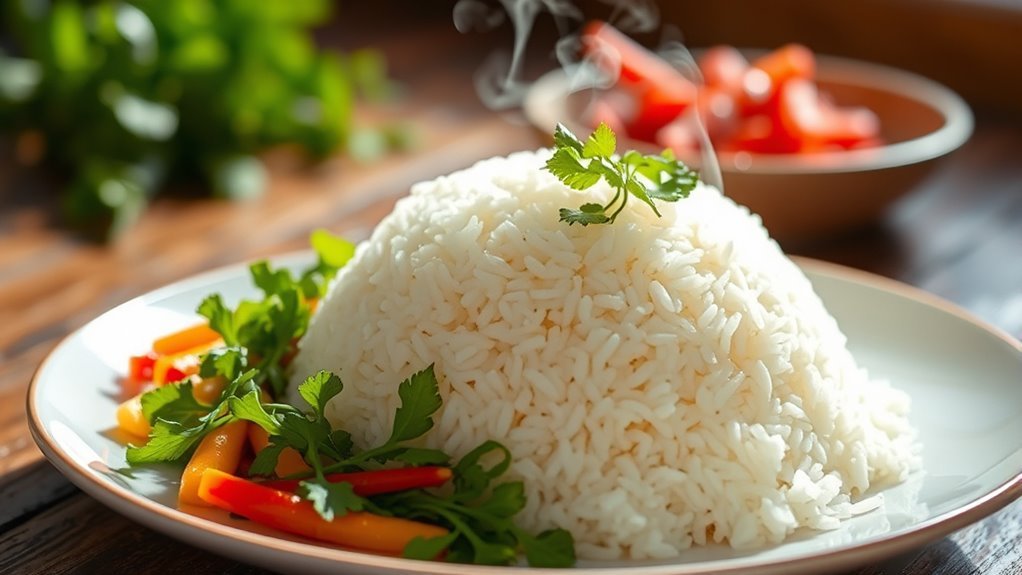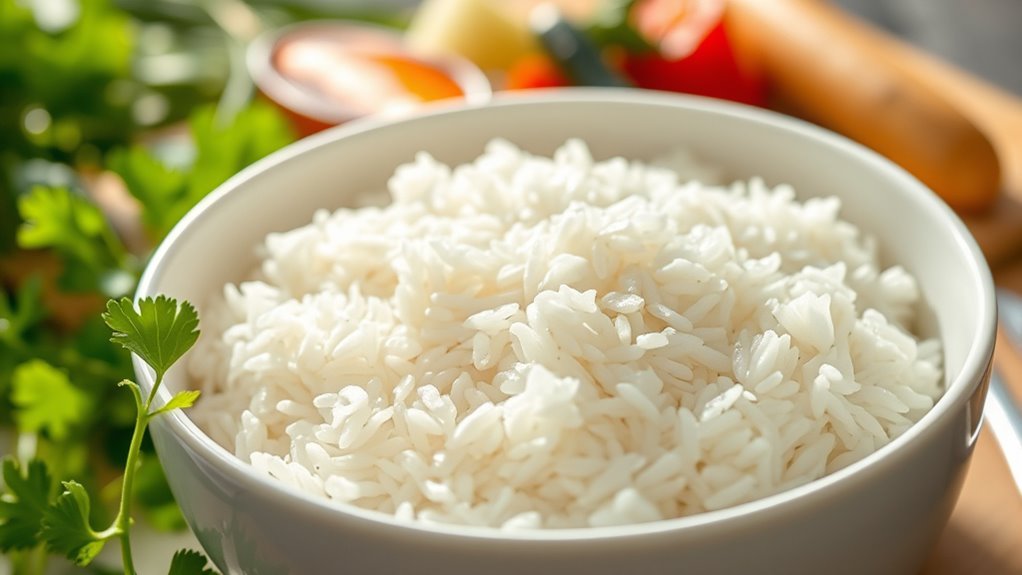Jasmine rice isn’t keto-friendly due to its high carbohydrate content, containing about 45 grams of carbs per serving. This can disrupt ketosis, as your body converts those carbs into glucose, potentially spiking blood sugar levels. If you’re aiming for a low-carb lifestyle, you’ll want to limit your intake of jasmine rice or consider alternatives. There are several options that can keep your meals exciting while supporting your dietary goals. Discover more options and tips to manage your carb intake effectively.
Nutritional Profile of Jasmine Rice

When considering the nutritional profile of jasmine rice, it’s essential to look at its macronutrient composition. Jasmine rice primarily consists of carbohydrates, which provide a quick source of energy. In addition to carbs, it contains a modest amount of protein and minimal fat, making it a versatile option in various cooking methods. The nutritional benefits of jasmine rice include essential vitamins and minerals, such as B vitamins and iron, which support overall health. While cooking methods like steaming or boiling can enhance its texture, you can also explore stir-frying for added flavor. However, it’s vital to balance your intake with other nutrient-rich foods to maintain a well-rounded diet that aligns with your dietary goals.
Carbohydrate Content Compared to Other Rice Varieties

Although jasmine rice is a popular choice for its fragrant aroma and texture, its carbohydrate content is noticeably higher compared to other rice varieties. In a typical serving, jasmine rice contains around 45 grams of carbohydrates, considerably more than basmati or brown rice, which offer about 39 and 34 grams respectively. This carbohydrate comparison is vital for those following a low-carb or keto lifestyle. If you’re considering rice options, it’s important to be aware of these differences. While jasmine rice can be a delicious addition to meals, its higher carbohydrate levels may not align with your dietary goals. Ultimately, understanding these distinctions empowers you to make informed choices regarding your food intake.
The Impact of Jasmine Rice on Ketosis

The high carbohydrate content of jasmine rice can considerably impact your ability to maintain ketosis. When you consume jasmine rice, your body undergoes a specific rice metabolism that converts those carbs into glucose. This process can spike your blood sugar levels, potentially disrupting ketosis effects, which is the state where your body burns fat for fuel instead of carbohydrates. If you’re aiming for a strict ketogenic lifestyle, the extra carbs from jasmine rice can push you out of ketosis, making it challenging to achieve your dietary goals. While jasmine rice may be delicious, being mindful of its carbohydrate load is essential for maintaining that desired state of fat burning. Balancing your meal choices will help you stay in control of your ketosis journey.
Keto-Friendly Alternatives to Jasmine Rice
If you’re looking to maintain a ketogenic diet, there are several keto-friendly alternatives to jasmine rice that can satisfy your cravings without jeopardizing your ketosis. One popular option is cauliflower rice, which is made by grating or processing cauliflower into small, rice-like pieces. It’s low in carbs and offers a neutral flavor that pairs well with various dishes. Another great choice is shirataki noodles, made from konjac yam. These noodles are extremely low in carbohydrates and calories, making them an excellent substitute for traditional pasta or rice. Both cauliflower rice and shirataki noodles provide versatility in your meals while helping you stick to your keto lifestyle. Enjoy experimenting with these alternatives to keep your meals exciting!
Tips for Incorporating Rice Into a Low-Carb Diet
While it might seem challenging to incorporate rice into a low-carb diet, there are smart strategies that can help you enjoy this staple without derailing your goals. Consider these tips:
Incorporating rice into a low-carb diet is possible with smart strategies that keep your goals intact.
- Use Rice Substitutes: Try cauliflower rice or shirataki rice in your low carb recipes to mimic the texture without the carbs.
- Portion Control: If you choose to use jasmine rice, limit your serving size to keep carbs in check.
- Enhance Flavor with Vegetables: Mix rice with low-carb veggies to increase volume and nutrients while reducing the overall carb impact.
- Pair with Protein: Serve your rice with a protein-rich dish to balance your meal and keep you satisfied longer.
These strategies can help you enjoy a versatile diet while sticking to your goals.
Frequently Asked Questions
Can Jasmine Rice Be Included in a Cheat Meal?
When considering a cheat meal, jasmine rice can definitely be included, but keep in mind its carb content. If you’re aiming for a low-carb diet, rice alternatives like cauliflower rice or shirataki noodles might be better choices. However, if you’re craving that fluffy texture and aren’t overly strict, enjoying jasmine rice occasionally won’t derail your progress. Just be mindful of portion sizes to balance your overall intake. Enjoy your cheat meal!
What Is the Glycemic Index of Jasmine Rice?
The glycemic index of jasmine rice typically ranges from 68 to 80, which classifies it as a high-glycemic food. This means it can cause a rapid spike in blood sugar levels. If you’re looking for alternatives, consider options like cauliflower rice or quinoa, which have lower glycemic loads. These substitutes can help you maintain better blood sugar control while still enjoying a satisfying meal. It’s all about finding the right balance for your dietary needs.
How Does Jasmine Rice Affect Blood Sugar Levels?
Jasmine rice can greatly affect your blood sugar levels due to its high carbohydrate content. When you consume it, your body breaks down those carbs quickly, leading to a rapid insulin response. This spike can cause fluctuations in your blood sugar, making it important to monitor your intake if you’re managing your blood sugar levels. Balancing it with fiber-rich foods can help mitigate these effects, giving you more freedom in your diet.
Are There Any Health Benefits to Eating Jasmine Rice?
You might find it surprising, but jasmine rice does offer some health benefits. Its nutritional profile includes essential carbohydrates, which provide energy for your day. Plus, the fiber in jasmine rice can support digestive health, helping to keep things moving smoothly. While it’s not the only healthy grain out there, enjoying it in moderation can fit into a balanced diet, allowing you the freedom to savor its unique flavor without guilt.
Can Jasmine Rice Be Combined With Keto-Friendly Foods?
You can certainly combine jasmine rice with keto-friendly foods, but it’s essential to be mindful of your carb intake. Pairing jasmine rice with low carb alternatives, like grilled chicken or sautéed vegetables, can help balance your meal. Consider using smaller portions of rice while incorporating healthy fats, such as avocado or olive oil, to enhance flavor and keep you satisfied. This way, you can enjoy a diverse meal while staying aligned with your dietary goals.
Is jasmine rice keto friendly?
What are the carbohydrate contents of jasmine rice?
Can I include jasmine rice in a keto diet in moderation?
What are some low-carb alternatives to jasmine rice?
What happens if I eat jasmine rice on a keto diet?
References
- https://www.healthline.com/nutrition/keto-diet-food-list
- https://www.ncbi.nlm.nih.gov/pmc/articles/PMC7022244/
- https://www.webmd.com/diet/what-is-the-keto-diet
- https://www.health.harvard.edu/staying-healthy/the-ketogenic-diet
- https://www.mayoclinic.org/healthy-lifestyle/nutrition-and-healthy-eating/expert-answers/keto-diet/faq-20458407
- https://www.cdc.gov/healthyweight/healthy_eating/index.html
- https://www.nutrition.org.uk/healthyliving/healthyeating/keto-diet.html


